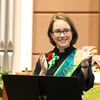 Usually when we think about intergenerational church programming, we see children and youth sitting with adults. We see them working together on faith-forming activities. It's a beautiful image and an important one.
Usually when we think about intergenerational church programming, we see children and youth sitting with adults. We see them working together on faith-forming activities. It's a beautiful image and an important one.
And yet, looking at these ages as two groups misses out on the diversity in God's people.
There are many things to think about when we bring diverse age groups together. Some are due to developmental or age/stage differences. Others related to historical time and place and the meaning to participants.
Our landscape of ages is more complex than many of us realize. We know some generational names, but few of us think about the distinct needs of each generation. We generally treat adults as one big group when, in reality, we have at least four generations in most of our churches.
For reference, here's a breakdown of our generations:
Greatest Generation: born before 1927
Silent Generation: born 1928-1945
Baby Boomer Generation: born 1946-1964
Generation X: born 1965-1980
Millennial Generation: born 1981-1996
Generation Z or Post-Millenial Generation: born after 1997
Each of these generations has their own unique experiences and ways of engaging the world. If we dig deep, we see that these different approaches signify the culture of each generation.
Even if you don't have time to focus on exactly how these age groups are comparable, you can build an intergenerational Sunday school in the same way you would a cross-cultural experience. Knowing there are differences in customs, preferences, language, and perspectives honor each generation and welcome all to join.
I'd also ask that you focus on what intergenerational means to you and your church. Most likely, your active adult Sunday School classes already have several generations. What would an intergenerational approach mean to those pre-existing groups?
In the same way that we see ages and stages in any of our church programs, looking at generational differences can open up a whole new world of possibility in ways to engage people where they are, see their viewpoints, and honor how they give to both a Sunday School experience and your whole church.



